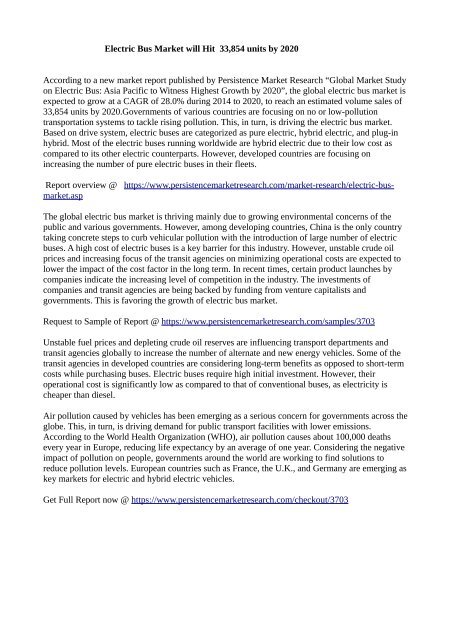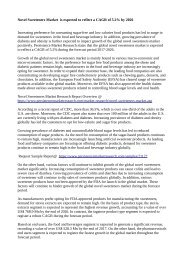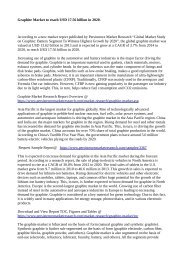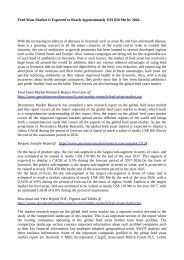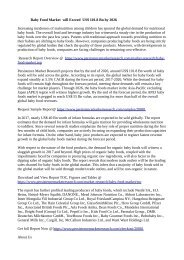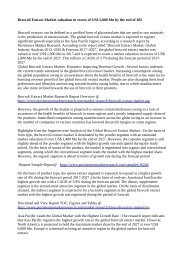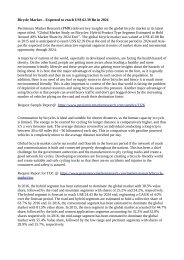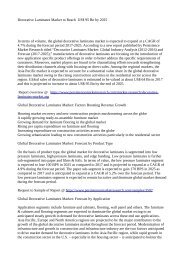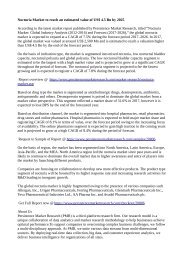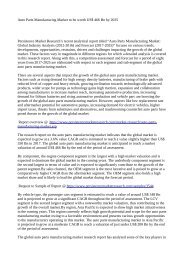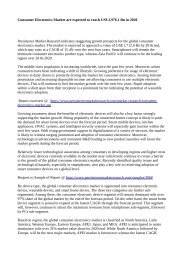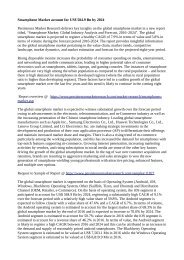Electric Bus Market
- No tags were found...
Create successful ePaper yourself
Turn your PDF publications into a flip-book with our unique Google optimized e-Paper software.
<strong>Electric</strong> <strong>Bus</strong> <strong>Market</strong> will Hit 33,854 units by 2020<br />
According to a new market report published by Persistence <strong>Market</strong> Research “Global <strong>Market</strong> Study<br />
on <strong>Electric</strong> <strong>Bus</strong>: Asia Pacific to Witness Highest Growth by 2020”, the global electric bus market is<br />
expected to grow at a CAGR of 28.0% during 2014 to 2020, to reach an estimated volume sales of<br />
33,854 units by 2020.Governments of various countries are focusing on no or low-pollution<br />
transportation systems to tackle rising pollution. This, in turn, is driving the electric bus market.<br />
Based on drive system, electric buses are categorized as pure electric, hybrid electric, and plug-in<br />
hybrid. Most of the electric buses running worldwide are hybrid electric due to their low cost as<br />
compared to its other electric counterparts. However, developed countries are focusing on<br />
increasing the number of pure electric buses in their fleets.<br />
Report overview @ https://www.persistencemarketresearch.com/market-research/electric-busmarket.asp<br />
The global electric bus market is thriving mainly due to growing environmental concerns of the<br />
public and various governments. However, among developing countries, China is the only country<br />
taking concrete steps to curb vehicular pollution with the introduction of large number of electric<br />
buses. A high cost of electric buses is a key barrier for this industry. However, unstable crude oil<br />
prices and increasing focus of the transit agencies on minimizing operational costs are expected to<br />
lower the impact of the cost factor in the long term. In recent times, certain product launches by<br />
companies indicate the increasing level of competition in the industry. The investments of<br />
companies and transit agencies are being backed by funding from venture capitalists and<br />
governments. This is favoring the growth of electric bus market.<br />
Request to Sample of Report @ https://www.persistencemarketresearch.com/samples/3703<br />
Unstable fuel prices and depleting crude oil reserves are influencing transport departments and<br />
transit agencies globally to increase the number of alternate and new energy vehicles. Some of the<br />
transit agencies in developed countries are considering long-term benefits as opposed to short-term<br />
costs while purchasing buses. <strong>Electric</strong> buses require high initial investment. However, their<br />
operational cost is significantly low as compared to that of conventional buses, as electricity is<br />
cheaper than diesel.<br />
Air pollution caused by vehicles has been emerging as a serious concern for governments across the<br />
globe. This, in turn, is driving demand for public transport facilities with lower emissions.<br />
According to the World Health Organization (WHO), air pollution causes about 100,000 deaths<br />
every year in Europe, reducing life expectancy by an average of one year. Considering the negative<br />
impact of pollution on people, governments around the world are working to find solutions to<br />
reduce pollution levels. European countries such as France, the U.K., and Germany are emerging as<br />
key markets for electric and hybrid electric vehicles.<br />
Get Full Report now @ https://www.persistencemarketresearch.com/checkout/3703


